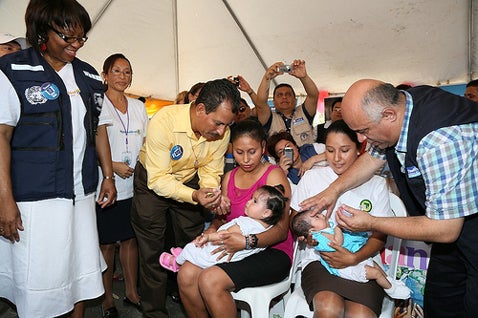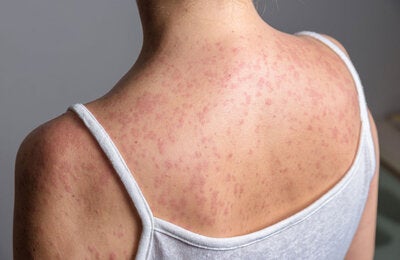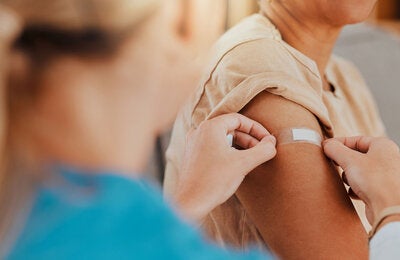

Top health authorities from Belize and Guatemala joined the director of the Pan American Health Organization/World Health Organization (PAHO/WHO) and representatives of other national and international organizations on April 24th to officially launch the 11th annual Vaccination Week in the Americas.
Initiative supported by PAHO/WHO promotes equity and access to immunization and Pan American cooperation
Belize—Guatemala Adjacency Zone, 24 April 2013 (PAHO/WHO) — Top health authorities from Belize and Guatemala joined the director of the Pan American Health Organization/World Health Organization (PAHO/WHO) and representatives of other national and international organizations today to officially launch the 11th annual Vaccination Week in the Americas.

PAHO Director, Minister of Health of Belize (left) and Minister of Health of Guatemala (right) vaccinate children in celebration of Vaccination Week in the Americas.
This year's Vaccination Week, being held April 20—27, seeks to protect more than 44 million children and adults in 44 countries and territories from vaccine-preventable diseases including polio, measles, rubella, influenza, tetanus, hepatitis B, and others.
Today's official launch of Vaccination Week was held in the "Adjacency Zone" between Benque Viejo, Belize, and Melchor de Mencos, Guatemala. Health ministers Pablo Marin of Belize and Jorge Alejandro Villavicencio of Guatemala joined PAHO Director Carissa F. Etienne in highlighting the role of Vaccination Week in promoting expanded both access to immunization and Pan American cooperation in health.
"Why do we celebrate vaccination? Why have the governments of our countries, the World Health Organization and the Pan American Health Organization dedicated one week every year to highlighting this topic?" asked Etienne. "It is because vaccines are incredibly powerful tools of health prevention."
"Vaccination has proven over the years that it is one of the most effective means of preventing childhood diseases, and it is one of the actions we have prioritized in our 1,000 Days Window program, a strategy for fighting malnutrition in Guatemala," said Villavicencio.
"Challenges to health recognize few boundaries, and the challenges we face in Belize and Guatemala, we face together," said Marin. "Health-care providers on either side of the border already work closely together on many public health issues including immunization. In these difficult times, we must continue to work together to ensure that the advances we have made over the last years are not lost."
The Americas region has a proud history of leadership in fighting vaccine-preventable diseases. It was the first region in the world to eradicate smallpox and polio, and has since eliminated measles and rubella. Countries throughout the region continue to maintain high rates of routine vaccination coverage.
"These achievements are thanks to the hard work and dedication of ministries of health, national immunization programs, countless health-care workers, families and communities," said Etienne. "Today, our children can be protected from diseases that our parents and our grandparents once feared. This is an incredible gift."
The slogan for this year's Vaccination Week in the Americas is "Vaccination: a shared responsibility," highlighting the importance of governments, health workers, communities, families and individuals all doing their part to raise awareness, access, and coverage of vaccines. This year's regional initiative coincides with the second celebration of World Immunization Week, a global initiative endorsed by the World Health Assembly in May 2012.
Other participants in today's launch included Roberto Valent, United Nations resident coordinator for Belize (on behalf of U.N. Secretary-General Ban Ki-moon); Kim Simplis Barrow, spouse of Belize's prime minister; Carla E. Lee, public health advisor of the U.S. Centers for Disease Control and Prevention (CDC); Sergio Benitez, director of the OAS Peace Fund; Juliet E. Mallet, OAS representative in Belize; Christian Skoog, UNICEF representative in Guatemala; Ramiro Quezada, health and nutrition specialist of UNICEF; Enrique Zelaya, UNAIDS coordinator for Guatemala and Mexico; Juan De Mora, UN advisor on security for Guatemala and Belize; Gerardo de Cosío and Guadalupe Verdejo, PAHO/WHO representatives in Belize and Guatemala, respectively; and representatives of government and nongovernmental institutions and organizations and the local community.
The regional launch featured a flag parade by Belizean and Guatemalan children and cultural presentations from both countries.
Vaccination is one of the most successful and cost-effective interventions for public health, preventing some 2—3 million deaths each year around the world.
PAHO was established in 1902 and is the oldest public health organization in the world. It works with all the countries of the Americas to improve the health and quality of life of their peoples. It also serves as the Regional Office for the Americas of the World Health Organization (WHO).
Note: Vaccination Week in the Americas reinforces the Agreement to Establish a Transition Process and Confidence Building Measures Between Belize and Guatemala, supported by the General Secretariat of the Organization of American States (OAS).
Links



